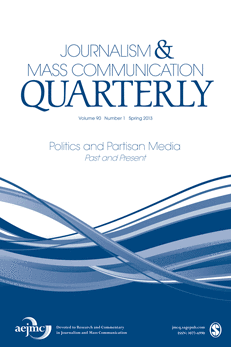
JOURNALISM & MASS COMMUNICATION QUARTERLY
Scope & Guideline
Advancing insights in journalism and mass communication.
Introduction
Aims and Scopes
- Interdisciplinary Approaches to Journalism Studies:
The journal embraces a variety of methodologies from different disciplines, including sociology, psychology, cultural studies, and political science, to analyze journalism's role and impact in society. - Focus on Media Effects and Public Perception:
Research often investigates how media framing, representation, and narratives shape public perception, trust, and engagement with news, particularly in the context of contemporary social issues. - Crisis and Conflict Reporting:
The journal frequently addresses the challenges and methodologies of reporting in crisis situations, such as wars, pandemics, and social movements, highlighting the ethical dilemmas faced by journalists. - Diversity and Representation in Media:
A consistent theme involves examining the representation of marginalized groups in media and the implications for social justice and equity, reflecting a commitment to promoting diverse voices in journalism. - Technology and Digital Media Influence:
The impact of digital technologies on journalism practices, audience engagement, and information dissemination is a critical area of study, with an emphasis on the challenges posed by misinformation and algorithmic biases.
Trending and Emerging
- Social Media's Role in Journalism:
Research increasingly examines how social media platforms influence news dissemination, audience engagement, and the construction of public narratives, reflecting the growing importance of digital communication. - Journalism and Activism:
There is a noticeable trend towards exploring the intersections between journalism and social movements, particularly how media can empower activism and influence public opinion on social justice issues. - Misinformation and Fact-Checking:
The rise of misinformation has led to a surge in studies focused on fact-checking practices, media literacy, and the role of journalism in combating false narratives, highlighting the urgency of these issues in the digital age. - Mental Health and Journalism:
Emerging research is increasingly addressing the mental health challenges faced by journalists, particularly in the context of high-stress reporting environments and the psychological impacts of covering traumatic events. - Innovative Storytelling Techniques:
There is a growing interest in how new technologies, such as virtual reality and data journalism, are reshaping storytelling in media, offering fresh perspectives on traditional journalistic practices.
Declining or Waning
- Traditional Journalism Ethics:
There seems to be a reduced emphasis on traditional ethics in journalism, as contemporary discussions increasingly focus on adaptive ethical frameworks that respond to digital challenges and misinformation. - Historical Perspectives on Journalism:
Research that primarily concentrates on historical analyses of journalism's evolution may be receiving less attention, as scholars prioritize current issues and future directions in the field. - Print Media and Its Challenges:
With the rise of digital media, studies specifically centered on print journalism's challenges and decline appear to be diminishing, as the focus shifts toward digital transformation and its implications. - Conventional Audience Research:
Traditional audience research methodologies, which often relied on quantitative measures of engagement, are less prevalent as qualitative and mixed methods gain traction in understanding audience behavior in a digital context. - Local Journalism Studies:
The exploration of local journalism issues may be declining, overshadowed by broader discussions about global media dynamics and the impacts of major national and international events.
Similar Journals
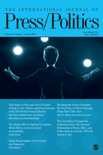
International Journal of Press-Politics
Connecting Scholars to the Heart of Press-PoliticsThe International Journal of Press-Politics, published by SAGE Publications Inc, stands as a premier scholarly platform at the intersection of communication, sociology, and political science. With a distinguished history dating back to its inception in 2003 and maintaining its relevance through 2024, this journal is recognized in the academic community for its rigorous exploration of the dynamics between the media and political processes. The journal proudly holds a Q1 ranking in both Communication and Sociology and Political Science categories, placing it in the top tier of its field, underscored by its impressive Scopus rankings, which reflect its global influence and reach. With an intention to foster innovative research and discourse, IJPP is committed to being accessible, contributing significantly to the understanding of how press and politics shape societal narratives, thus serving as an essential resource for researchers, professionals, and students alike. Explore this esteemed journal to engage with cutting-edge studies that drive the field forward.

Communication & Society-Spain
Empowering Scholars to Shape the Future of CommunicationCommunication & Society-Spain, published by Universidad de Navarra, is an esteemed open access journal dedicated to advancing scholarship in the dynamic fields of communication and cultural studies. Since its inception in 1988, the journal has maintained a commitment to disseminating high-quality research that engages with contemporary issues and contributes to the evolving discourse around communication theories and practices. With a commendable Q1 ranking in both Communication and Cultural Studies categories, it stands as a prominent source for researchers and professionals alike, reflecting its robust presence in the academic community—evidenced by its Scopus rankings placing it in the top percentiles within both fields. The journal's scope encompasses diverse perspectives and methodologies, thereby fostering interdisciplinary dialogue essential for understanding the complexities of communication in society. With a publication history that spans from 2010 to 2024 and a ranking of #87 out of 1304 in Cultural Studies, our commitment to open access ensures that impactful research is readily available to all, promoting further scholarly engagement and innovation.
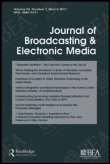
JOURNAL OF BROADCASTING & ELECTRONIC MEDIA
Exploring the Frontiers of Media InnovationThe JOURNAL OF BROADCASTING & ELECTRONIC MEDIA, published by Routledge Journals, Taylor & Francis Ltd, is a premier academic publication in the field of communication, officially recognized in the Q1 category for its exceptional quality and impact. With a rich history dating back to 1985, this journal serves as a vital platform for innovative research and critical discussions surrounding broadcasting and electronic media, addressing contemporary issues in digital communication, media technology, and audience studies. The journal boasts an impressive Scopus rank of #73 out of 511 in the Social Sciences - Communication category, placing it within the top 15% of its field. Researchers, professionals, and students alike benefit from its insightful articles that contribute to understanding the evolving landscape of media and communication. Although it does not currently operate under an Open Access model, its rigorous peer-review process ensures that published works meet high academic standards, sustaining its reputation as a cornerstone for scholarly discourse in the media industry.

Revista de Comunicacion-Peru
Illuminating Contemporary Issues in Communication.Revista de Comunicación-Perú is a distinguished open-access journal published by Universidad de Piura, with a dedicated focus on communication studies. Since its inception in 2002, the journal has provided a vital platform for researchers, professionals, and students to disseminate knowledge and foster discourse in the field of communication. As of 2023, it proudly holds a Q1 classification in the Communication category and ranks impressively in Scopus, placing at #117 out of 1304 in Cultural Studies and #160 out of 511 in Communication, demonstrating its significant impact within the academic community. The journal’s scope encompasses diverse topics related to communication, cultural discourse, and media analysis, making it an essential resource for those seeking to explore contemporary issues in these areas. With a commitment to promoting scholarly exchange, Revista de Comunicación-Perú continues to play a pivotal role in shaping the communication landscape in Peru and beyond.
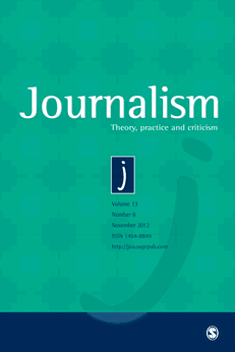
Journalism
Advancing the Discourse on Journalism's Role in a Changing WorldJournalism is a leading interdisciplinary journal published by SAGE Publications Inc, renowned for its rigorous academic standards and impactful research. With an ISSN of 1464-8849 and E-ISSN 1741-3001, the journal has established itself within the top quartile of both the Arts and Humanities and Communication fields, boasting an impressive rank of 22nd out of 552 in Arts and Humanities (miscellaneous) and 35th out of 511 in Social Sciences (Communication) as of 2023. This journal, based in the United Kingdom, is committed to fostering scholarly dialogue surrounding journalism’s evolving role in society, covering a wide range of topics including media ethics, digital communication, and the impact of state and global politics on public discourse. Notably, the journal does not offer open access, enhancing its exclusive appeal to academics and professionals. With a focused scope that extends from 2000 to 2024, Journalism contributes to the understanding of emerging trends and challenges, making it an invaluable resource for researchers, practitioners, and students alike seeking to engage deeply with contemporary issues in the field.
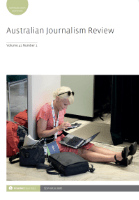
Australian Journalism Review
Elevating Academic Discourse on JournalismAustralian Journalism Review, published by INTELLECT LTD, is a leading academic journal that focuses on the dynamic field of journalism and communication. With the ISSN 0810-2686 and E-ISSN 2517-620X, this journal has established itself as a significant contributor to understanding contemporary journalism in Australia and beyond. It boasts a respectable Q2 ranking in the Communication category for 2023, positioning it among the top journals in its field, with a Scopus rank of #273 out of 511 in Social Sciences Communication, reflecting its growing impact within academic and professional circles. The journal’s scope includes critical analyses of journalism practices, media policy, and the evolving roles of journalists in society, making it an essential resource for researchers, professionals, and students interested in the intersection of media, ethics, and culture. Although it does not currently offer open access, interested audiences can find valuable insights from its converged issues, spanning from 2003 to 2024, allowing for a comprehensive view of the progression and transformation of journalism studies.

Doxa Comunicacion
Cultivating a vibrant community of communication scholars.Doxa Comunicación is a prominent open-access journal dedicated to advancing the field of communication studies, published by Universidad San Pablo CEU, under the Faculty of Humanities and Communication Sciences. Established in 2003, this journal has gained recognition for its commitment to disseminating high-quality research and thought-provoking articles, fostering a vibrant academic community. With an ISSN of 1696-019X and an E-ISSN of 2386-3978, Doxa Comunicación occupies a vital niche in the academic landscape of Spain, contributing to both national and international discourses. In the 2023 rankings, it is categorized in the Q3 quartile within the fields of Communication and Social Sciences (miscellaneous), reflecting its competitive standing among peer publications. The journal's diverse scope, including contemporary communication theories and practices, ensures relevance for researchers, professionals, and students alike. With a Scopus rank of #333 in Social Sciences (miscellaneous) and #291 in Communication, Doxa Comunicación serves as an essential platform for innovative research that addresses the complex challenges of modern communication in a rapidly evolving society.

Vestnik Moskovskogo universiteta. Seriya 10. Zhurnalistika
Illuminating Ethics in Journalism ResearchVestnik Moskovskogo universiteta. Seriya 10. Zhurnalistika, published by the prestigious M V Lomonosov Moscow State University, serves as a vital conduit for scholarly discourse in the fields of journalism and communication. With an ISSN of 0320-8079 and an E-ISSN of 0320-8079, the journal showcases rigorously peer-reviewed research and theoretical contributions that span diverse aspects of media studies, social communication, and journalism ethics. As of 2023, it is classified within the Q3 category in both Communication and miscellaneous Social Sciences, ranking #372 out of 511 and #445 out of 604, respectively, indicating its growing influence and relevance in these crucial academic domains. Despite not being Open Access, researchers and students alike can leverage the journal's valuable insights, which continue to shape contemporary understanding of media's impact on society. With a commitment to excellence and a focus on the rapidly evolving landscape of journalism, Vestnik Moskovskogo universiteta. Seriya 10. Zhurnalistika remains an essential resource for anyone looking to engage deeply with current debates and developments in the communication field.
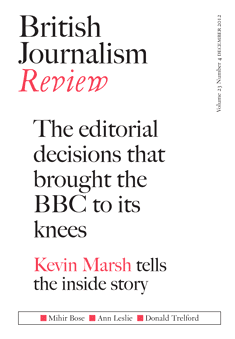
British Journalism Review
Connecting Scholars and Practitioners in MediaBritish Journalism Review is a distinguished academic journal dedicated to the exploration and analysis of the rapidly evolving field of journalism. Published by SAGE Publications Ltd, this journal plays a critical role in disseminating high-quality research that addresses key issues facing journalists and media organizations today. With an ISSN of 0956-4748 and an E-ISSN of 1741-2668, it is a pivotal resource for scholars, practitioners, and students alike. Although the journal does not currently offer Open Access options, it maintains a strong commitment to academic rigor and innovation in journalism studies. By engaging with a diverse range of topics such as media ethics, the impact of digital technologies, and the changing landscape of news consumption, the British Journalism Review remains instrumental in shaping contemporary debates and enhancing the scholarly discourse in its field.
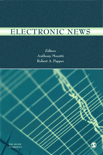
Electronic News
Advancing Knowledge at the Intersection of Communication and Innovation.Electronic News, published by SAGE PUBLICATIONS INC, stands at the forefront of scholarly communication, focused on the dynamic intersection of media, technology, and society. With an ISSN of 1931-2431 and an E-ISSN of 1931-244X, this journal has established itself as a valuable resource for academics and professionals alike, exploring critical themes in communication and information systems. Operating from its base in the United States, Electronic News operates within a competitive landscape, boasting a commendable Q2 ranking in Communication and a Q3 ranking in Information Systems. This reflects its commitment to high-quality research and impactful insights, as evidenced by its Scopus rankings, where it ranks #238 out of 511 in Social Sciences Communication and #302 out of 394 in Computer Science Information Systems. Although currently embracing a traditional subscription model, the journal serves as a crucial platform for disseminating knowledge that shapes the future of news and media in a rapidly evolving digital age. As it converges from 2009 to 2024, Electronic News continues to invite contributions that address the multifaceted challenges and innovations of news media, making it an essential resource for researchers, practitioners, and students eager to engage with contemporary issues in communication.